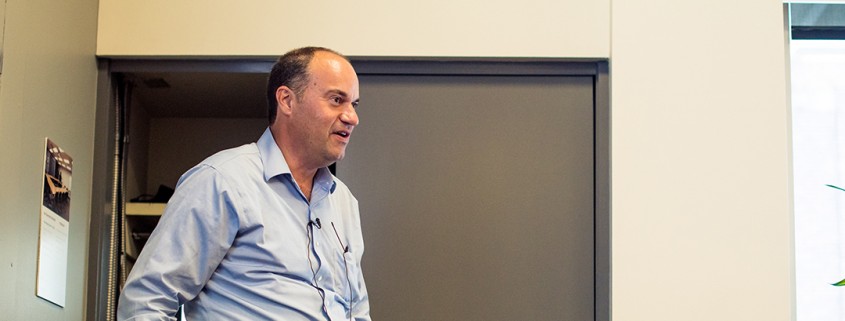Annenberg professor speaks on China’s economy
Professor Matthew Kahn, in conjunction with the USC Annenberg US-China Institute, presented his book, Blue Skies Over Beijing: Economic Growth and the Environment in China, and discussed the implications of pollution on China’s society Thursday afternoon.
Kahn, a professor in the economics department of the USC Dornsife College of Letters, Arts and Sciences, focuses on researching environmental and urban economics. He co-wrote the book with Siqi Zheng, the director of the Hang Lung Center for Real Estate at Tsinghua University in China.
In the book, Zheng shares her experiences of growing up and living in China. She determined her lifestyle based on the pollution levels in the air each day, Kahn said.
Kahn used his statistical background when writing the book to offer hope that China is incentivizing reducing pollution and suggested that the country will eventually implement more sustainability initiatives.
“I’m always an optimist,” Kahn said. “My mother always told me not to engage in wishful thinking, but I’m always looking for good news.”
Kahn began the presentation by showing decreasing concentrations of particulate matter (PM10) in Chinese cities from 2002 to 2012. PM10 measures pollution and is linked with increased morbidity, Kahn said.
“Beijing’s pollution declined when the population and per-capita income was growing,” Kahn said.
Kahn specifically mentioned the low levels of PM10 during the 2008 Olympics.
“Air pollution is getting better,” Kahn said. “When the Olympics took place [in Beijing], there was a huge drop in PM10.”
Kahn then walked the audience through the 10 chapters of his book. In it, he discusses the need for sustainability certifications, green real estate development and the investment in human capital.
Zheng and Kahn suggest that China should adopt measures to verify more sustainable buildings to drive green real estate development. Kahn credits the internet, the Chinese getting richer and the global low-carbon push in driving environmental justice.
“The Chinese have lost their information monopoly,” Kahn said. “This is how you bring about accountability.”
He focused on the quality of Chinese urban living as the nation grows richer.
“China has shown a willingness to adopt new ideas,” he said. “As people and nations grow richer, they’re willing to be pay more to be exposed to less risk.”
He cites the global movement to reduce carbon emissions and the Chinese realization of it as the pressure needed to promote and pass green initiatives.
“In recent years, the central government is making a green push,” Kahn said. “The Chinese government has not had the firmest grasp on power. One way to continue to have power is to be loved by your people. If people want blue skies, then out of self-interest, the Chinese Communist Party actually has interest to supply them. Especially with technological change, it becomes cheaper.”
Clayton Dube, director of the USC U.S.-China Institute, believes it is essential for the USC community to learn more about the relationship between the United States and China.
“The purpose of these programs is to inform public discussion,” Dube said. “We think that the most important relationship in the world is the U.S.-China relationship.”
Maggie Chen, a junior majoring in social science with an emphasis in economics, attended Kahn’s talk to learn more about the issue. While working as an intern in Beijing the past year, she frequently noticed high pollution levels.
“They do have some blue skies, but sometimes it’s really bad, and you can’t see anything,” Chen said. “I thought it was interesting to see this from a more academic perspective.”
Kahn also writes a blog about urban economics and the environment called Green Economics.
Kahn does not blame China for increased pollution. Rather, he described it as a side effect the people have to find a way to counter.
“Nobody intends to produce pollution,” Kahn said. “Pollution is a by-product of how we live today, economic activity. If we change the game — if we have pollution taxes, if we encourage green research and development — we have ways to have cleaner conditions with the same level of economic growth.”

